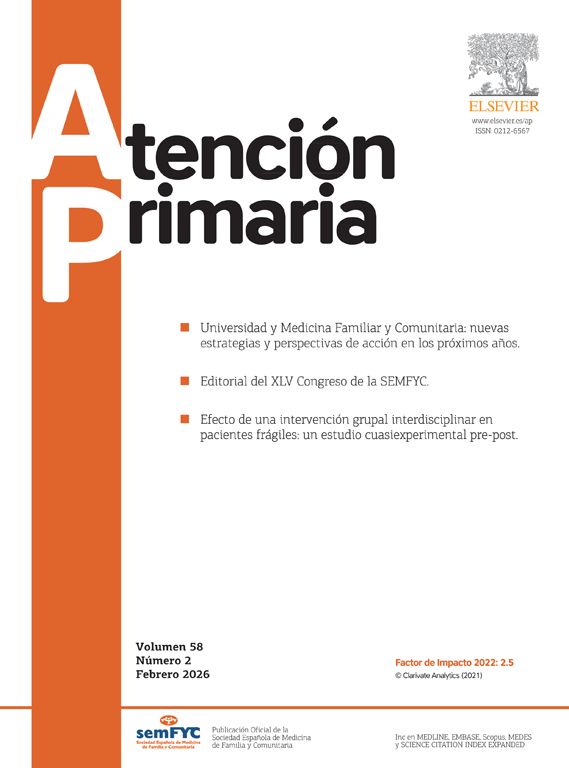We present the results of a continued before and after quality improvement study In the primary care setting in Barcelona, including all the 51 centres, encompassing primary care centres, primary care out of hours services, primary care sexual and reproductive services, and the home visit service, belonging to the Catalonian Institute of Health. The methodology used is explained in a previous publication in this journal.1 In a nutshell, a simple multifaceted intervention on the management of cystitis among women with strong institutional support was designed starting in November 2020 and ending in the summer of 2021. The intervention consisted of choosing a group of leaders in different sites, one 45-min session, feedback on antibiotic prescribing and updated resistance of uropathogens, and provision of infographics for professionals and patients. This first multifaceted intervention resulted in an increased percentage of first-line antibiotics prescribed after this first intervention for uncomplicated urinary tract infections (UTIs), with either a single-dose 3g fosfomycin sachet or nitrofurantoin 100mg t.i.d.1
During 2022 a new intervention on the management of UTIs in men, and pyelonephritis and prostatitis was initiated. A second session on the management of UTIs, covering the new material and also reinforcing the recommendations presented during the first year, was carried out in the second semester in 2022 in each centre. For the purpose of this letter, we evaluated the impact of its implementation by only assessing the variation in the prescription of the different antibiotics for the empiric treatment of uncomplicated UTIs in women from 2020 to the first semester in 2023. The authors accessed aggregated antibiotic prescribing data from the computerised pharmacy records of dispensed drugs reimbursed by the Catalan Health Service, meaning that individual patients could not be identified. This study was granted an exemption from the Ethical Committee Board Jordi Gol (Barcelona, Spain), as ethical approval for quality improvement studies is not required in Spain.
As shown in Fig. 1, the appropriateness of antibiotic use in uncomplicated UTIs in the different settings increased significantly from 2020 to 2023. In the primary care centres, the prescribing of one sachet of fosfomycin and nitrofurantoin increased from 26.5% and 1.8% in 2020 to 50.9% and 4.9% in the first semester in 2023, respectively (Fig. 1A). This increase was even more striking in the four out-of-hour services (13.9% and 0.6% in 2020 and 48.1% and 9.1% in 2023, Fig. 1B). Conversely, the prescribing of the presentation of two sachets of fosfomycin, amoxicillin and clavulanate, and quinolones decreased during the period studied, whereas the prescribing of second, third and fourth generation cephalosporins did not show great variations during this period.
This study shows that a simple continued multifaceted stewardship intervention, which included clinician education – at least two 45-min sessions were carried out in all the centres –, feedback, and the provision of accessible information for healthcare professionals and the general population with UTIs led to a significant improvement in antibiotic prescribing for UTIs. Specifically, there was an increase in the number of first-line antibiotics for uncomplicated episodes of cystitis and a reduction in the number of quinolones, amoxicillin and clavulanate and the presentations of two doses of fosfomycin. These findings align with results from similar low-intensity multifaceted interventions implemented in other countries in the same settings as in our study.2,3 This study highlights the importance of designing interventions that are both simple and tailored to address specific conditions and are aimed at improving the management of infectious diseases in primary care settings.4
Ethical considerationsThis paper complies with ethical considerations.
FundingNo specific funding was received for this study.
Conflict on interestAll authors declared no conflicts of interest.
The authors wish to thank institutional support, the members of PROA-ICS Barcelona Study Group and leaders in the different centres.
M. Estrella Barceló Colomer (Muntanya District), Gladys Bendahan Barchilon (Esquerra District), Albert Boada Valmaseda (Àrea Assistencial del Servei Català de la Salut), M. Eugènia Buil Arasanz (Raval Nord Health Centre), M. Amparo de la Poza Abad (Carles Ribas Health Centre), Pilar Enseñat Grau (nurse, Verneda Sud Health Centre), Eladio Fernández Liz (Muntanya District), Yannick Hoyos Mallecot (Microbiology Department, Vall d’Hebron Hospital), Jordi Gost Rosquellas (Home Visit Unit), Marta Lestón Vázquez (Dreta District), Carl Llor (Via Roma Health Centre), Ana López Plana (Bon Pastor Health Centre), Joan A. Vallés Callol (Litoral District), Noemí Villen Romero (Dreta District).
Leaders in the different centres: Lidia Arpal Sagristà, Maria Atero Villén, Marta Badia Capdevila, Jesús Bellido Casado, Xavier Blancafort Sansó, Cristina Boté i Fernández, M. Eugenia Buil, Oriol Caixés Valverde, Silvia Calvet Junoy, Carmen Cid Gil, Josep M. Cots Yago, Leticia Cuenca Rodríguez, Maribel Cuenda Macias, Marta Cuní Munné, M. Amparo de la Poza Abad, Silvia Ferrer Moret, Yolanda García Fernández, Carolina Guiriguet Capdevila, Mercè Hernández Bonet, M. José Herrero Martínez, M. Ángeles Hortelano García, Reis Isern Alibes, Ana Jiménez Lozano, Yolanda Linares Sicilia, Natalia López Pareja, Ana M. López Plana, Ana Luque Alonso, Ricard Martínez Sala, Maria Miracle Fandós, Laia Montoya Salvadó, Sandra Moreno Cotés, Miriam Muñoz López, M. José Nieto López, Clara Ortí Segarra, M. Ángel Pérez Gómez, Leila Pifarré Portella, Melania Priego Artero, Iris Rivera Abelló, Brenda Riesgo Escudero, Aurora Rovira Fontanals, J. Ignacio Rodríguez Gómez, Ramón A. Rodríguez González, Sonia Rodríguez Martínez, Laura Rubio Pérez, Carlos Rueda Beas, Patricia Sala Sola, Elena Scazzocchio Dueñas, Neus Soler Solé, Julián Soto Marata, Sergi Surkov Daniluk, Trinitat Tovar Velasco, Carme Troyano Cussó, Mireia Valle Calvet, Sandra Veloso Rodríguez, Èlia Vinyes Roca, and Lucia Vivas Camino.









